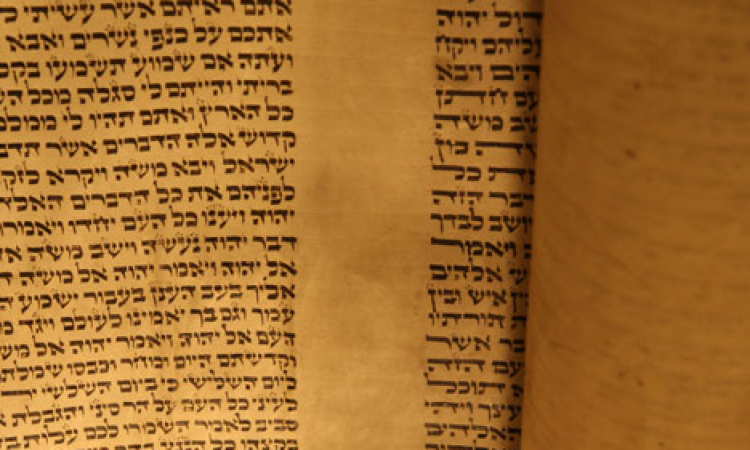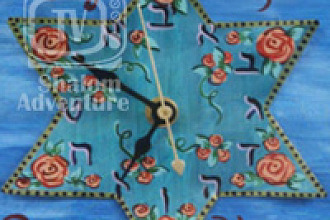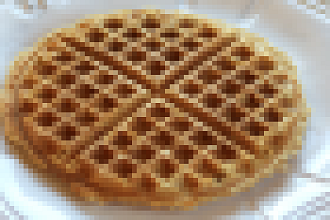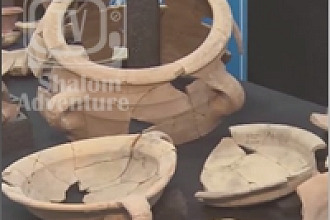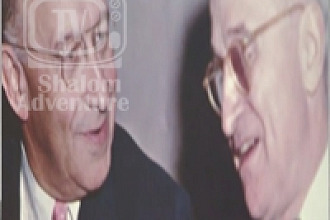Parasha for the Week: Vayakhel: Exodus 35:1 – 38:20
Aftarah for the Week: 1 Kings 7:13 - 51
Besorat Yeshua: Mark 15:42 – 16:6
Overview
Moshe Rabbeinu exhorts Israel to keep Shabbat, and requests donations of materials for making the Mishkan. He collects gold, silver, precious stones, skins and yarn, as well as incense and olive oil for the menorah and for anointing.
A princes of each tribe brought precious stones for the Kohen Gadol's breastplate and ephod.
G-d appoints Betzalel and Oholiav as the master craftsmen.
Bnei Yisrael contribute so much that Moshe begins to refuse donations.
Special curtains with two different covers were designed for the Mishkan's roof and door.
Gold-covered boards in silver bases were connected, forming the Mishkan's walls.
Betzalel made the Holy Ark (which contained the Tablets) from wood covered with gold.
On the Ark's cover were two figures facing each other.
The menorah and the table with the showbreads were also of gold.
Two altars were made: a small incense altar of wood overlaid with gold, and a larger altar for sacrifices made of wood covered with copper.
"Having a Willing Heart"
Moses commanded the Jewish people regarding the materials for the Tabernacle: "Whoever is of a willing heart, let him bring an offering of the Almighty." (Exodus 35:5) What lesson do we learn from the command being directed to those who have a "willing heart"?
Rabbi Simcha Zissel of Kelm explains that those who brought the offerings for the Tabernacle should bring their hearts with their offering. It is not sufficient just to give a monetary donation. The Almighty wants our hearts, that is our thoughts and our emotions.
"The Third Temple"
A heathen once asked the Talmudic sage Rabbi Eliezer this question: After having two Temples destroyed, why are you still waiting for the Third Temple. Why do you think that the Third Temple will be different? Rabbi Eliezer answered: Contrary to the first two Temples, the third one will not be built by man but by G-d. Thus, the Third Beth Hamikdash will last forever.
"Called by name"
The Torah states: the LORD has called by name Betzalel son of Uri son of Hur, of the tribe of Judah; he has filled him with divine spirit, with skill, intelligence, and knowledge in every kind of craft, to devise artistic designs, to work in gold, silver, and bronze... " (Exodus 35:30-3). What does it mean that God called him by name? God knows each of us personally, by name. He knows everything about us and He loves us. He has given each of us abilities and talents to use in His service. And He calls each of us to use those talents for His honor and glory.
"God desires that His workers in every line shall look to Him as the Giver of all they possess. All right inventions and improvements have their source in Him who is wonderful in counsel and excellent in working. The skillful touch of the physician's hand, his power over nerve and muscle, his knowledge of the delicate organism of the body, is the wisdom of divine power, to be used in behalf of the suffering. The skill with which the carpenter uses the hammer, the strength with which the musician makes the instrument ring, comes from God. He has entrusted men with talents, and He expects them to look to Him for counsel. Whatever we do, in whatever department of the work we are placed, He desires to control our minds that we may do perfect work". COL p.349
"Stop Giving"
The offerings came in so plentiful that Moses had to command the Jewish people to stop bringing materials for the Sanctuary: "And Moses gave commandment, and they caused it to be proclaimed throughout the camp, saying, Let neither man nor woman make any more work for the offering of the sanctuary. So the people were restrained from bringing. For the stuff they had was sufficient for all the work to make it, and too much." (Exodus 36:6,7) The people had given so willingly and generously that more than enough material was made for the building of the sanctuary. Of course this did not mean they were to stop giving their tithe and offerings for the work of the Levitical ministers or the up keep of the sanctuary, only that they had enough for the building project. This is a wonderful testimony of God's grace upon people's hearts. There is no record of anyone lacking anything because of their generosity. On the contrary the Biblical text records that all the time in the wilderness they had no lack and that their shoes did not wear out. "I have led you forty years in the wilderness: your clothes are not become old, and your shoe is not become old upon your foot." Deut. 29:5
Both of the Beth-El Shalom congregations in St. Petersburg and New Port Richey are in the midst of a building program. It will be a wonderful day when we can say we have more than enough for the building project. People have been very generous and the projects are moving forward and we are very thankful for that.
While the building of the sanctuary was in progress the people, old and young--men, women, and children--continued to bring their offerings, until those in charge of the work found that they had enough, and even more than could be used. And Moses caused to be proclaimed throughout the camp, "Let neither man nor woman make any more work for the offering of the sanctuary. So the people were restrained from bringing." The murmurings of the Israelites and the visitations of God's judgments because of their sins are recorded as a warning to after-generations. And their devotion, their zeal and liberality, are an example worthy of imitation. All who love the worship of God and prize the blessing of His sacred presence will manifest the same spirit of sacrifice in preparing a house where He may meet with them. They will desire to bring to the Lord an offering of the very best that they possess. A house built for God should not be left in debt, for He is thereby dishonored. An amount sufficient to accomplish the work should be freely given, that the workmen may be able to say, as did the builders of the tabernacle, "Bring no more offerings." Patriarch & Prophets p. 344
Haftara: 1 Kings 7:13 - 51
Parasha: God asks Israel to continue to build the sanctuary, Moses choose Betzalel for all artistic work because he was skilled. "Then Moses said to the Israelites: See, the LORD has called by name Betzalel son of Uri son of Hur, of the tribe of Judah; he has filled him with divine spirit, with skill, intelligence, and knowledge in every kind of craft, to devise artistic designs, to work in gold, silver, and bronze... " (Exodus 35:30-3).
Haftara: About four hundred year later Solomon choose Hiram from Tyre for artistic work because he was a skilled man: 'King Solomon sent for Hiram and brought him down from Tyre. He was the son of a widow of the tribe of Naphtali, and his father had been a Tyrian, a coppersmith. He was endowed with skill, ability, and talent for executing all work in bronze. He came to King Solomon and executed all his work." (1Kings 7:13-14)
The great lesson of this haftara is that when we want to do or to build something for the Lord we have to do our best, to select the best material for the Lord.
Before dying, David gave to Solomon all instruction about the temple and commanded his son to build the House of the Lord. He prepared everything and gave a lot of treasure for that house. Solomon followed the instruction given by David and when everything was finished he put all the treasure David gave him in the temple. "When all the work that King Solomon had done in the House of the LORD was completed, Solomon brought in the sacred donations of his father David — the silver, the gold, and the vessels — and deposited them in the treasury of the House of the LORD" (1Kings 7:51). Doing this donation, David followed the command of Moses who said to Israel to make donation for the sanctuary. What a great lesson for each one of us. It is unfortunately when the Lord ask us for an offering and donations for his work, and we keep the best part for ourselves and give only what is left over to the Lord.
Besorat Yeshua: Mark 15:42 – 6:6
In this reading the Mashiach has been rejected, given to the Roman solders to make an example of Him. It was almost Passover, the time of the sacrifice of the Passover lamb, The Messiah who is our Passover lamb died for our sins so the angel of death would pass over us.
Because this special day was the day of the preparation of the Shabbat Yeshua's body was taken down. "When evening had come, and since it was the day of Preparation, that is, the day before the Sabbath" (Mark 15:42).
A Jewish man, a member of the Sanhedrin, who believed that Yeshua was the Mashiach, wanted to give to Yeshua a decent buriel. "Joseph of Arimathea, a respected member of the council, who was also himself waiting expectantly for the kingdom of God, went boldly to Pilate and asked for the body of Y'shua" (Mark 15:43). Only Pilate can give this permission. Pilate knew that some believers could invent stories about the Nazarene, so he wanted to be sure that Yeshua died before delivering his body for the burial: Then Pilate wondered if he were already dead; and summoning the centurion, he asked him whether he had been dead for some time. When he learned from the centurion that he was dead, he granted the body to Joseph". (Mark 15:44-45). All the preparation for his burial was done, he was buried in the tomb. However the great miracle of the resurrection occurred. 'very early on the first day of the week, when the sun had risen, they went to the tomb'. An angel appeared to them and affirmed: "But he said to them, Do not be alarmed; you are looking for Y'shua of Nazareth, who was crucified. He has been raised; he is not here. Look, there is the place they laid him." (Mark 16:2,6)
Parasha for the Week: Pikudei: Exodus 38:21 – 40:38
Aftarah for the Week: 1 Kings 7:51 – 8:21
Besorat Yeshua: Mark 16:7 - 20
Overview
The Book of Shemot (Exodus) concludes with this Parsha. After finishing all the different parts, vessels and garments used in the Mishkan, Moshe gives a complete accounting and enumeration of all the contributions and of the various clothing and vessels which had been fashioned.
Bnei Yisrael bring everything to Moshe. He inspects the handiwork and notes that everything was made according to G-d's specifications.
Moshe blesses the people.
Hashem tells Moshe that the Mishkan is to be set up on the first day of the first month, Nissan.
He also tells Moshe the order of assembly for the Mishkan and its vessels.
When the Mishkan was completed a cloud stood over it, indicating that G-d's glory rested there.
Whenever the cloud moved away from the Mishkan, Bnei Yisrael would follow it. At night a pillar of fire replaced the cloud.
"Ordination with Heart & Joy"
After being told to anoint his brother Aharon (Aaron), Moshe was told in reference to Aharon's sons, "And you shall anoint them as you anointed their father" (Exodus 40:15). Why did the Almighty give Moses this special instruction? Rabbi Meir Simcha HaCohen suggests that when Moses was told to anoint his brother Aaron, he was able to do it with a complete heart. Moses, the younger brother, was the leader of the Israelites and was happy that his brother was the High Priest. However, in reference to Aaron's sons, the situation was different. Moses' own sons were not going to succeed him as leaders. So, when it came to anointing Aaron's sons, Moses might have felt envy. Therefore, the Almighty told Moses to anoint Aaron's sons with the same whole heart and joy with which he anointed their father. If even a person such as Moses needed to internalize attitudes to avoid envy, all the more so do we! Also, it is possible to feel joy and enthusiasm for another person's success even if he has something that you do not.
"Moses Followed All the Instructions Given by God"
The Torah states: "Moshe did all that the Almighty commanded him; that is what he did." (Exodus 40:16) Why does the verse end with the seemingly repetitious restatement of what Moshe did? Rabbi Naftali Tzvi Yehuda Berlin, comments: Moshe's motivation in all that he did for the Sanctuary was for the Almighty's honor. Moshe was not motivated by thoughts of his own glory. Neither was he motivated by thoughts of the honor of his brother, Aharon, who was to be the High Priest. Moshe focused solely on doing the will of the Almighty.
Rabbi Yechezkail Abramsky said, "Every time I go to deliver a Torah lecture I have in mind that I am now going to serve the Almighty with the mitzvah of teaching Torah. At times, to sincerely think these thoughts is even more difficult than any other aspect of giving the lecture."
Rabbi Kalman Packouz says: "It is a very difficult task to do something from which you will have great benefit and to still have pure motivations. However, the more sacred the work you are involved in, the greater the importance of having elevated thoughts and motivations."
"The Wise and the Foolish"
A father had two sons. One was clever while the other was foolish. The foolish son thought that he was the smartest person on earth and that everyone else was foolish. One day, the father said to the smart son, "Take your brother to the big city and show him around. Perhaps he will realize that he does not know everything." They came to the big city and passed by a store that made furniture. The silly brother said, "Look how people are taking good and expensive wood, piercing holes through them and cutting them into pieces! I told you everyone was foolish!" The brother didn't say anything but continued on. They came to another store that made clothing and again the foolish one exclaimed, "Look! Here, too, the people are taking beautiful pieces of cloth and cutting them up!" "Wait here a while," answered the intelligent brother, "and you will see who is the fool." Before long, they saw that the cut pieces were sewn together and, in time, beautiful garments were produced. "Now lets go back to the furniture store." There too, they saw that carpenters were using the pieces of wood to create beautiful furniture. "Now I see," said the silly son. "Perhaps it is I who is the fool and not everyone else!"
The fact that we know that everything is from G-d, regardless of the uncertainty and confusion the world is going through, should give us good reason to have faith and trust in G-d that, in the end, things will turn out for the best."
"A Golden Leg"
Rabbi Chanina Ben Dosa' wife said Once to him, "How long do we have to go on suffering so much?" "What shall I do?" replied Rabbi Chanina. She said, "Pray that some of what is stored up for the righteous in the World-to-come shall be given you in this world now." Rabbi Chanina prayed and a hand descended from heaven which gave him a table leg made of gold. That night in a dream Rabbi Chanina ben Dosa saw each of the other righteous men in the World-to-Come, dining at a table with three legs, but he and his wife were dining at a table with only two legs. In the morning he told his wife about the dream. He said to his wife, "Are you content that all the righteous will dine at three legged tables for all eternity, while you and I will be dining at a table with one of its legs missing?" "What shall we do?" she asked. "You must pray that the leg be taken from us!" Rabbi Chanina prayed and it was taken back. Are we willing to wait for heaven to receive our rewards for all eternity or do we prefer to enjoy them now for a short season. Would you prefer to have a shinny dime now or wait for $10,000 at the end of the year. Only an ignorant child would choose the dime now. Wait upon the Lord and He shall give you the desires of your heart.
Haftara: 1 Kings 7:51 – 8:21
Parasha: When we study this parasha we see that three men are glorified in this text, first Moses, his name is given 26 times in this short text of two chapters. But also Ithamar son of Aaron, and Bezalel son of Uri son of Hur, of the tribe of Judah. Even though their names are only at the beginning of our parasha it is repeated 19 times that they have done everything "as the LORD had commanded Moses" (Exodus 38:21-40:25).
Haftara: In the Haftara, the one who is on the top for what he has done is King Solomon. His name is given 7 (perfect number) times in this short text. (1Kings 7:51 - 8:12). Other parallels between the Parasha and the Haftara are that in the parasha it is written, So Moses finished the work. (Exodus 40:33) and in the haftara it is written, Thus all the work that King Solomon did on the house of the LORD was finished. (1Kings 7:51). Both of them finished the work.
What did Moses do after finishing the work? "When Moses saw that they had done all the work just as the LORD had commanded, he blessed them" (Exodus. 39:43). And what did Solomon do after finishing the work? He blessed twice, first the assembly and second the Lord. "Then the king turned around and blessed all the assembly of Israel, while all the assembly of Israel stood. He said, "Blessed be the LORD, the God of Israel," (1Kings 8:14-15)
Then if we continue to read together the parasha and the haftara, we notice that the Lord was satisfied, He blessed the sanctuary and the temple by his presence. At the time of Moses, "Then the cloud covered the tent of meeting, and the glory of the LORD filled the tabernacle." (Exodus 40:34). At the time of Solomon, "So that the priests could not stand to minister because of the cloud; for the glory of the LORD filled the house of the LORD." (1Kings 8:11). Moses and Solomon are both working for the Lord and according to his spirit.
Besorat Yeshua: Mark 16:7 - 20
Parasha: This parasha ends the book of Exodus.
Besorah: This Besorah ends the book of Mark.
Parasha: In this parasha the sanctuary is filled by the glory of the Lord "Then the cloud covered the tent of meeting, and the glory of the LORD filled the tabernacle." (Exodus 40:34)
Besorah: The besorah shows us the glory of the Mashiach who has been raised from death and appeared to many people. First to Miriam, "Now after he rose early on the first day of the week, he appeared first to Miriam of Magdalene" (Mark 16:9). After this he appeared to two of His disciples, as they were walking on the way to Emmaus. (Mark 16:12). Later he appeared to the eleven disciples as they were sitting at the table; (Mark 16:14). The Mashiach wants to fill all the earth with the Glory of the Lord, that's why he gave them a great mission: "Go into all the world and proclaim the good news to the whole creation. The one who believes and is immersed will be saved; but the one who does not believe will be condemned." (Mark 16:15)

